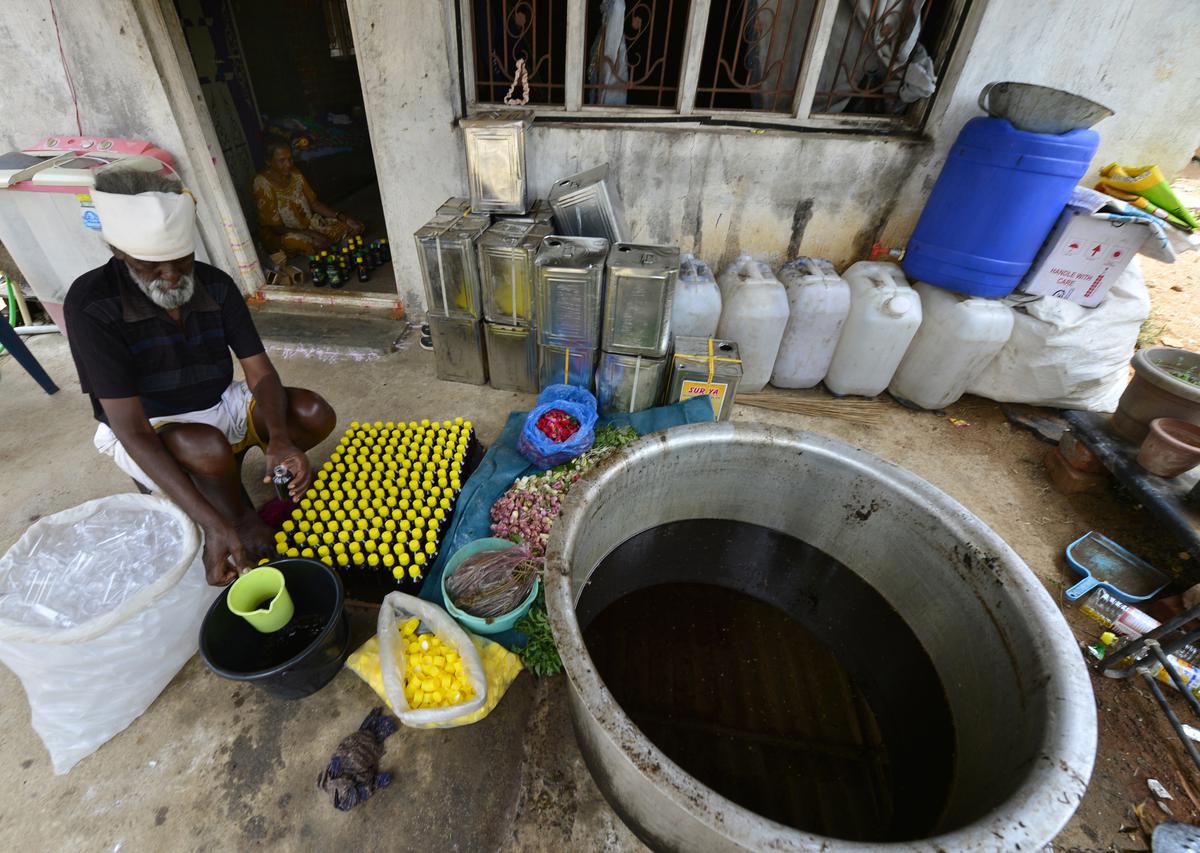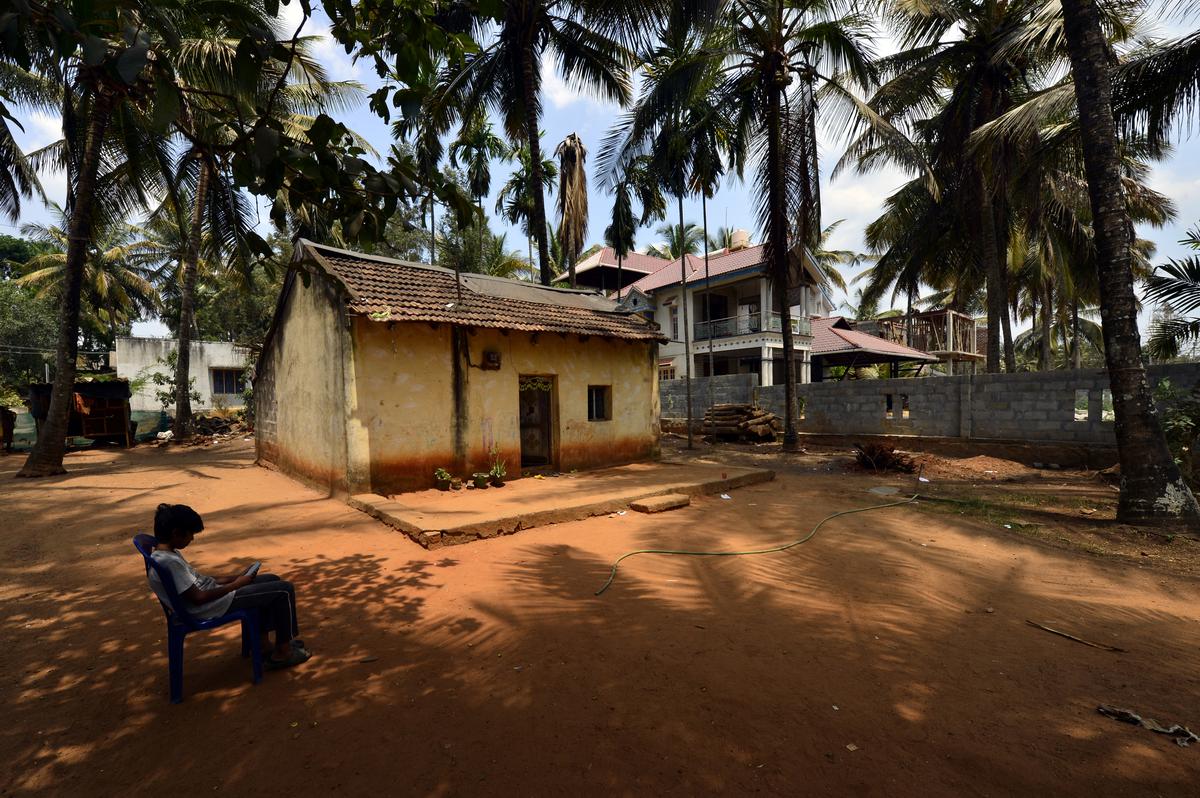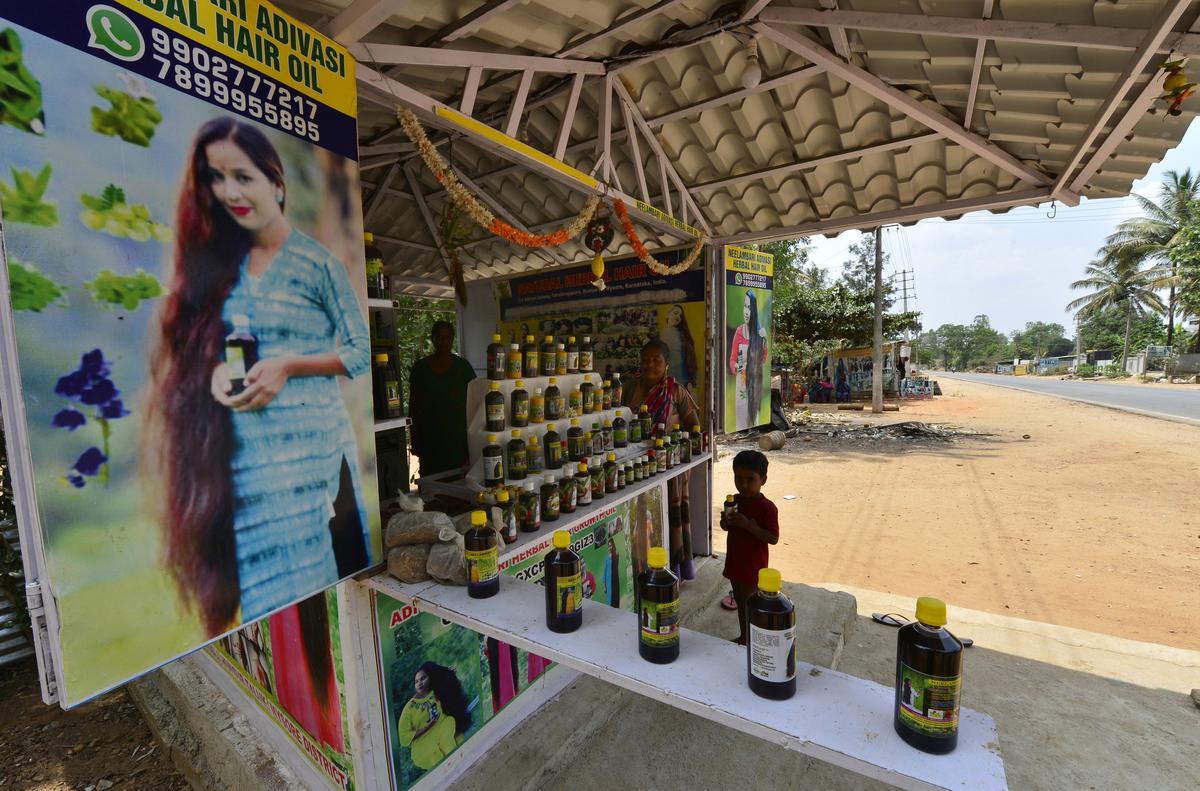Karanthai, 23, an anganwadi teacher in Pakshirajpura, a settlement of the nomadic Hakki Pikki tribe, six kilometers from Hunsur town in Mysuru district, was cleaning fish for lunch at her home on a hot afternoon, as she eagerly prepares for about 15 days. The fish was waiting. His mother, two brothers and their wives who were stranded in violence-hit Sudan. He went to Sudan about eight months ago to sell traditional medicine, which is in high demand. The family was in shock, trapped in a rented house with little food and water.
His brother Manu, who is caught in the conflict in the African country, said, ‘We thought we would die. Fortunately, we returned. We thank our people for their support and help from the government.”
back home to vote
A week ago, they returned home safely and even voted in the Karnataka state assembly elections held on Wednesday, May 10. However, with large sums taken in the form of loans for travel, and no means of earning to repay it, many are willing to take the risk of traveling to other African countries to try their luck.
According to Karnataka State Disaster Management Authority (KSDMA) officials, around 600 people from the Hakki Pikki tribe were stuck in Sudan and almost all have returned home. They returned to the state after the Ministry of External Affairs launched Operation Kaveri on April 24 to evacuate Indian nationals stranded in conflict zones in Sudan.

Yuvraj of Hakki Pikki community fills herbal oil in bottles at Pakshirajapura Colony in Hunsur taluk of Mysore district. , Photo credits: Bhagya Prakash K.
bird catchers for traditional medicine
Wani, 45, who recently returned from Sudan with a group of 31 people, was in Sudan for the past 10 months selling traditional medicine, while many other community members have been traveling to African countries for the past 15 years .
Hunsur has two colonies dedicated to the Hakki-Pikki community, which were established in 1958 by the Government of Karnataka. About 1,500 people live in this colony, and their main occupation is the production of various traditional oils and medicines, which according to them are in great demand across the country.
The Hakki Pikki (bird catchers) are a semi-nomadic tribe who came to Karnataka from parts of Gujarat and Rajasthan at least 100 years ago and were into the business of bird catching and hunting. However, in the last 20 years, they have started preparing traditional medicines, especially hair oil, which they sell in different parts of the country and also send abroad. The community gave up catching and hunting the birds after it was declared illegal under the Wildlife Protection Act of 1972.
talking to Hindu At his home in Pakshirajpura, PS Nanjunda Swamy, state president of Karnataka Adivasi Budakattu Hakki Pikki Sangha, said, “My forefathers came from different parts of Gujarat and Rajasthan. We first settled in Hyderabad for some time and later moved to Bangalore in the 1950s and then to Mysore, where the government gave us this colony to settle. Now, our community has around 11,800 members settled in Davanagere, Bannerghatta, Chikkamagaluru, Hassan, Shivamogga in Bengaluru.

A house at Pakshirajapura Colony-2, built by the central government for members of the Hakki Pikki community in Hunsur taluk of Mysore district. , Photo credits: Bhagya Prakash K.
“life changing medicine”
The members of the community belong to the Scheduled Tribes and speak Wagri Buli, an Indo-Aryan language. This language is spoken in their house only and outside they speak Kannada. Some people of the community went to the neighboring state of Kerala to learn the preparation of traditional medicine and started preparing it. Hair oil made from various herbs available in the forest has transformed the lives of the community, especially in Pakshirajpura.
Pakshirajpura, which once had only small houses, now has many modern houses and expensive cars. Most households have small production centers for the production of traditional medicines. The people of the community say that all this has become possible because of going to African countries.
financial problems
However, Mr. Nanjunda Swamy said, “Many people in our community have prospered, but they have taken a lot of debt. Another problem faced by our community is that many educated young boys do not want to do government or private jobs. They leave their studies and enter this business by taking loans and if it doesn’t work, they make losses.
During this conversation, 65-year-old Maitriya, who had a small shop nearby, jumped in and said that her son had also taken a loan and got into the business of traditional medicine and had suffered losses. He said that now he has opened a tea shop which is running in loss.
The contrast is clear: while some people in the community have become wealthy, others who tried the traditional medicine business and experienced severe losses are living in small houses in the colony.
In addition to traditional medicines, the community also sells and manufactures small daily use products and jewelry such as copper rings and chains, toys made of wood, and bird feathers.

One of the shops selling herbal oils prepared by the Hakki Pikki community near Pakshirajapura Colony-2 in Hunsur taluk, Mysuru district. , Photo credits: Bhagya Prakash K.
social media and online platforms
But the success stories of the traditional medicine business, especially hair oil, abound.
Prerna, 45, and her daughter Moksh, 22, have started selling hair growth oil on online marketplaces, even advertising on social media to get more customers. The mother-daughter duo has all the equipment for production and a laptop and packaging material to sell their products online. They both point to their own long hair, and claim to have reaped the benefits of hair oil.
Moksh receives at least 15 to 20 calls daily inquiring about the product as well as sales. while she was speaking Hindu, he received one such call from a customer in North India. “Earlier, we used to sell our products here in Mysuru and Bengaluru markets. Three years ago, we realized that there is a lot of potential in online and we can sell our products. Now, monthly, we get revenue in lakhs,” said Moksh.
Mr. Nanjunda Swamy said that some travel agents in Mysore made the community members aware of the demand for traditional medicine in African countries. “For the past 10 years, many people have traveled to African countries. They take raw materials in cargo planes to prepare oil and medicine and sell to people there. Our people stay there for a year and return with profit, but Sometimes they also suffer losses. They go through many challenges like this incident in Sudan.
Mysore and its surroundings
Meanwhile, many people from this community sell their traditional medicines on the main roads in and around Mysore. On the Hunsur-Nagrahole road, commuters can come across many small shops called ‘Mysore Jungle Tribal Herbal Hair Oil’, which claim that this oil is made by secret traditional methods. Chandni, who owns a shop on Nagarhole Road, said, “All these ingredients are brought from the forest and manufactured using secret methods. It is in huge demand locally and we earn at least ₹5,000 a day by selling this oil. Tourists visiting Kodagu and Nagarhole buy our traditional oil.”
Another woman from the community, Saroja, said that a 750 ml bottle of hair oil costs Rs 1,500 and massage oil costs Rs 1,000 to 2,500.
‘Shift us to other countries’
However, the profit they make overseas is incomparable. This became evident when family members of the Hakki Pikki community, who were stranded in Hunsur, in the midst of Operation Kaveri to rescue Indians stranded in Sudan, said that they did not want the stranded members of that country to return to India; Rather, they wanted them to be transferred to neighboring countries so that they could continue to sell their products and make a profit and return because they all took loans.
Managla, a hakki pikki member in Hunsur, said, “They have taken huge loans in lakhs of rupees from various sources, and went to Sudan a few months back with all the raw materials for traditional medicines. Now all are coming back because of the dispute Now we are worried about how we will repay the loan we have taken.
Subhas, whose brother was stranded in Sudan, said that his brother’s family had taken a loan of Rs 10 lakh and went to Sudan. “All these loans have been taken from some residents of the colony. Now they have to return it to the lenders. How can we do this? We all expected that he would do at least ₹20 to ₹30 lakh business and return with a good profit.
in fear, without food and water
Those returning home remembered their nightmares. Sivananda and his wife, from the Hakki Pikki tribe, were stranded in El-Fasher town for more than 20 days after the conflict began, where they faced hardship, living in fear and without proper food and water. He was in Sudan for the last 10 months to sell traditional medicine.
“The day the conflict started, we moved to el-Fesher and lived in a small rented house with 40 other people. We heard firing outside and were living in fear. Parts of our house were damaged, and a bullet pierced a wall during the firing. We were not able to go out because of the continuous shelling and shelling. So, we didn’t have enough food these days,” said Sivananda, now back safely.
Nand Kumar, another returnee from Sudan, said, “There was no access to food or drinking water for four days till April 16, and somehow the firing stopped for a day, and when a shop opened in the area we were able to get some rations.” managed to get.” Sometime. Thereafter, we got information that India was escorting us, and we boarded a bus and traveled to Port Sudan for the whole day. From there, we were rescued by the Government of India. We were in a very bad condition and had every doubt that we would be able to meet our family here.”